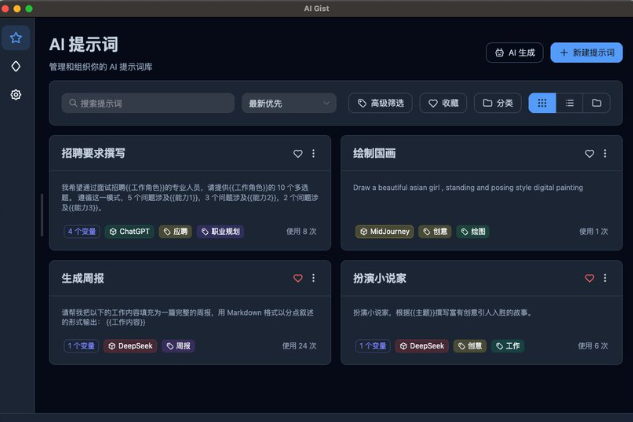AI Gist Launches as Open-Source Prompt Management Tool
AI Gist: The New Standard for AI Prompt Management
With generative AI becoming ubiquitous in development workflows, efficient prompt management has emerged as a critical need. AI Gist, an open-source tool released in July 2025, addresses this challenge through innovative features that streamline prompt creation and optimization.
Core Features Driving Adoption
Intelligent Template System
AI Gist's integration with Jinja templates allows developers to create dynamic prompts using variable replacement ({{variables}}) and control structures ({% logic %}). This enables:
- Context-aware prompt generation
- Reduced manual editing
- Consistent outputs across use cases

Multi-View Management Interface
The tool offers three organizational views:
- Card view for visual browsing
- Table view for data-heavy projects
- Category view for hierarchical structuring
Developers can further organize prompts using tags, ratings, and custom categories.
Technical Advantages
AI-Assisted Optimization
The built-in AI analyzer:
- Recommends prompt improvements
- Generates alternative phrasing
- Maintains version history with rollback capability
Cloud Synchronization
All prompts automatically sync across devices via encrypted cloud backup, enabling seamless team collaboration.
Global Accessibility
The interface currently supports:
- English
- Simplified/Traditional Chinese
- Japanese With additional languages planned based on community feedback.
Community-Driven Development
Released under Apache 2.0 license, AI Gist has already seen:
- 100+ GitHub stars
- 40+ community contributions
- Regular feature updates including recent keyboard shortcut additions
The development roadmap includes enhanced template libraries and enterprise deployment options.
Key Points
- Dynamic prompts via Jinja template system
- Cross-platform access with cloud sync
- Multilingual UI lowers adoption barriers
- Open-source model encourages community development
- Version control maintains prompt iteration history